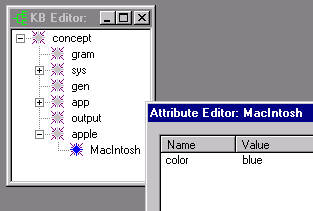
Replace all matching attribute-value pairs attrStr-oldValStr in the KB belonging to the concept aConcept to new attribute-value pairs attrStr-newValStr.
returnedBoolean = attrchange(aConcept, attrStr, oldValStr, newValStr)
returnedBoolean - type: bool
aConcept - type: con
attrStr - type: str
oldValStr - type: str
newValStr - type: str
1 if at least one pair is changed, 0 otherwise.
Think of this as a global replace. If passed a bad concept, the function writes an error to the output log.
# if you find apples in the concept hierarchy
if (findconcept(findroot(),"apple"))
# kill them (to start fresh)
rmconcept(findconcept(findroot(),"apple"));
# Create the apple concept
G("apple") = makeconcept(findroot(),"apple");
# Apple's color's red
addstrval(G("apple"),"color","red");
# MacIntosh apples are also red
addstrval(makeconcept(G("apple"),"MacIntosh"),"color","red");
# Print out apple's attribute and value
if(attrname(findattrs(G("apple")))){
"output.txt" << "1) apples " << attrname(findattrs(G("apple")));
"output.txt" << " "
<< getstrval(attrvals(findattrs(G("apple")))) << "\n";
}
# Test for a given attribute and value
"output.txt" << "2) are apples red? "
<< attrwithval(G("apple"), "color", "red") << "\n";
"output.txt" << "3) are apples blue? " <<
attrwithval(G("apple"), "color", "blue") << "\n";
# Change a value of a given attribute to another value.
attrchange(findroot(), "color", "red", "blue");
"output.txt" << "4) are apples blue now? " <<
attrwithval(G("apple"), "color", "blue") << "\n";
The code above writes the following to output.txt:
1) apples color red
2) are apples red? 1
3) are apples blue? 0
4) are apples blue now? 1
Since attrchange operates on all children of the parent concept, the resulting KB looks like:
